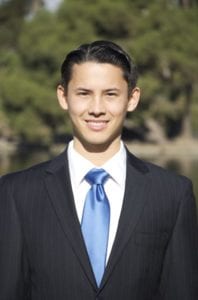 I am doing series of student blog posts starting with this one from Vincent Cook from my Fall 2014 Training and Development class. I think asking students to write blog posts is a great way to get them to apply concepts and boost their professional social media presence. Today I am sharing a post from Vincent Cook.
I am doing series of student blog posts starting with this one from Vincent Cook from my Fall 2014 Training and Development class. I think asking students to write blog posts is a great way to get them to apply concepts and boost their professional social media presence. Today I am sharing a post from Vincent Cook.
Inspired by Nobel Prize winner Rudyard Kipling, Vincent uses the poem “If” as a metaphor of what makes a great training workshop presentation.
Blog Post written by Vince Cook
Rudyard Kipling’s poem “If” is a motivational and self-development poem derived from his painstakingly tragic life, it can provide great insight to facilitating a training workshop and factors that we should consider.
In paragraph one, Kipling addresses notions and phenomena such as staying calm when things go wrong and when others assign blame but keeping faith and confidence in yourself when others are doubtful, as well as not looking too good or talking too wise.
When hosting a training workshop, it is crucial as a presenter to remain calm when issues arise and mistakes happen. A presenter should not draw attention to the mistake, rather remain confident and continue on; no apologies are necessary. Group members should not doubt or blame the other during the presentation or when preparing. Teams should work cohesively to perform and produce quality results for the participants. Presenters are also supposed to speak to the audience in a relative and engaging way and never approach the topic in a condescending manner.
In paragraph two, Kipling metaphorically describes conflict with unprincipled persons and potential pitfalls. Not all audience members will agree with information provided, and some may not entirely respect explicitly stated ground rules. Still, it is important to remember that as a presenter. YOU are in control and YOU are the one who has thoroughly researched your topic. Seize that control with your group members and leverage it to your advantage to determine the course and outcome of the workshop.
In the last passage, Kipling speaks of the importance of staying true to one’s self unconditionally, whether talking with crowds or walking with a king. He also utilizes a metaphor to advise us to make the most out of the time that we have, for that time is limited and finite.
As facilitators of a workshop, we will talk with a crowd. We should be true to our own roles relative to the purpose of the learning objectives and outcomes. Because time is very limited, we as presenters must make the most out of the workshop by carefully choosing and selecting subtopics as well as practical training methods to enforce those subtopics.
Finally, as a reader, consider how the interpretations above can be understood differently to be applied to hosting a training workshop. Additionally, I would like you to consider how the rest of Kipling’s poem, which was not discussed above, can provide you with additional insight when preparing to host a Training & Development workshop.
Here is the original poem by Rudyard Kipling:
IF
If you can keep your head when all about you
Are losing theirs and blaming it on you;
If you can trust yourself when all men doubt you,
But make allowance for their doubting too:
If you can wait and not be tired by waiting,
Or, being lied about, don’t deal in lies,
Or being hated don’t give way to hating,
And yet don’t look too good, nor talk too wise;
If you can dream—and not make dreams your master;
If you can think—and not make thoughts your aim,
If you can meet with Triumph and Disaster
And treat those two impostors just the same:.
If you can bear to hear the truth you’ve spoken
Twisted by knaves to make a trap for fools,
Or watch the things you gave your life to, broken,
And stoop and build’em up with worn-out tools;
If you can make one heap of all your winnings
And risk it on one turn of pitch-and-toss,
And lose, and start again at your beginnings,
And never breathe a word about your loss:
If you can force your heart and nerve and sinew
To serve your turn long after they are gone,
And so hold on when there is nothing in you
Except the Will which says to them: “Hold on!”
If you can talk with crowds and keep your virtue,
Or walk with Kings—nor lose the common touch,
If neither foes nor loving friends can hurt you,
If all men count with you, but none too much:
If you can fill the unforgiving minute
With sixty seconds’ worth of distance run,
Yours is the Earth and everything that’s in it,
And—which is more—you’ll be a Man, my son!
